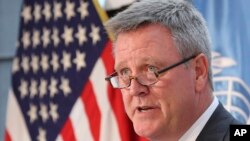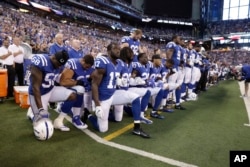Athletes should feel free to express their political opinions during next February's Winter Games in Pyeongchang despite strict Olympic rules barring such demonstrations, the head of the United States Olympic Committee (USOC) said on Monday.
Referring to Sunday's protest by over 100 NFL players, who went down on one knee during the national anthem to protest against racial inequality, USOC CEO Scott Blackmun said athletes had a right to air their opinions.
"The athletes you see protesting are protesting because they love their country, not because they don't," he said. "So we fully support that our athletes and everybody else to express themselves."
Blackmun acknowledged that the situation is trickier given the International Olympic Committee charter, which specifically bans "demonstrations of political, religious or racial propaganda" at Olympic venues.
"We have a little bit of a different state of play when it comes to the Olympic Games."
Blackmun praised the 1968 Olympic protest by American track and field athletes Tommie Smith and John Carlos, who gave a black power salute from the podium in Mexico City, sparking controversy. Smith later stated that the gesture was a "human rights salute."
"That was a seminal moment not only for the Olympic movement but the U.S. Olympic team and we recognized them last year by bringing them to the White House," he said.
Several Olympic hopefuls backed the protesting NFL players but said on Monday that it was too soon to say what they may do if they find themselves in a similar position.
"I respect what those guys did and I do believe there is a lot of room for social change. As a person of color I do think it's something that we need to address," said Elana Meyers, an American bobsled pilot and two-time Winter Olympic medalist. "But at the Olympics, the only time you get to hear your national anthem is if you win a gold medal. So it is going to come down to a game time decision."
Julia Mancuso, an alpine skier and four-time Olympic medalist, also supports the NFL players but said the dynamics are different for Olympic athletes.
"When it comes to the Olympics, I like to think that it's a special event not just like the NFL or pro sports teams that compete every weekend. For us it's every four years," she said.
"I'm proud of athletes that stand up for what they believe in... but I also like to think of us all as very patriotic athletes."










